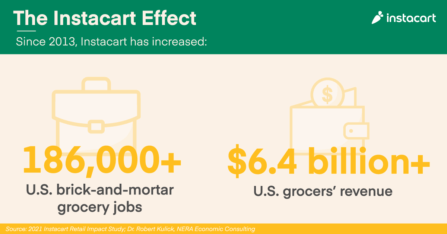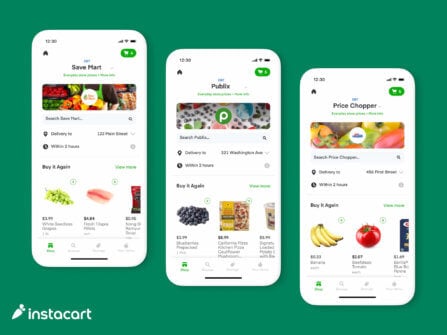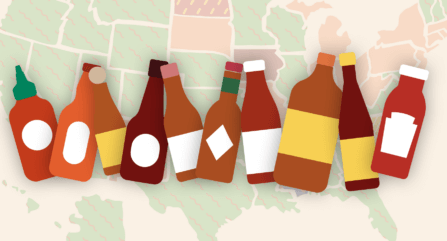Company Updates
How Generative AI is Revolutionizing Data Science

Food is emerging as one of the most common use cases for generative AI. While food is universal, at Instacart we know just how hard it is to get from asking “what’s for dinner?” to a full meal: figuring out the ingredients, balancing dietary preferences for the whole family, determining what’s available in the store, and getting the groceries home – all before even starting to cook!
At Instacart, AI/ML innovation sits at the core of our operations. We process vast amounts of grocery data, facilitating inventory optimization, efficient shopper routes and generating product recommendations. As cutting-edge advancements like generative AI emerge, we stay ahead of the curve by being early adopters – for instance, Instacart was one of the first to build a plugin for ChatGPT and brought AI-powered search to our own app with Ask Instacart. We’ve long used machine learning to power our service, and our vision is to bring this AI-first posture to everything we do, harnessing these technologies to further improve our products and operations. The specific tools may change, but our commitment to leveraging AI to better serve customers and shoppers remains constant.
As the Data Science team, we’re at the forefront of how we use data and emerging technology – both in the ways we work and to serve our customers. Internally, we’re using generative AI to create new tools that make it easier for Instacart employees to find information, run analyses, and parse insights. We also partner with product managers, engineers, and designers to build new product experiences that incorporate the latest advances in generative AI to better serve our consumers, advertisers, retailers, and shoppers.
Improving Efficiency to Deliver Faster Results
The Data Science team uses generative AI to deliver high-quality results significantly faster through improved tooling. We are able to significantly reduce manual work, like translating code between programming languages, creating and enhancing existing code, and evaluating Snowflake queries for cost-savings and execution velocity. This includes using external tools such as Github co-pilot as well as internal tools we have built in collaboration with our Eng team and OpenAI partners.
Specifically, generative AI has helped to accelerate productivity, making it easier to migrate tools and write complex code. For example, recently we migrated our business intelligence tools, and needed to generate custom Python code to support specific visualizations. Through internal coding co-pilots, we were able to quickly create the code required to reproduce key charts in the new tool.
As Instacart has grown, managing knowledge has become increasingly challenging. However, with the help of generative AI, we have successfully tackled this issue in the Data Science org. We have developed internal chatbots that are trained on both internal and publicly available documentation, enabling them to answer frequently asked questions about visualization, reporting, and experimentation tools. Previously, we relied on tribal knowledge to locate dashboards and datasets, but this internal tool now gives us more centralized access and helps us better manage this unified knowledge repository, ensuring that stakeholders and new employees can easily access the necessary resources. This streamlined approach democratizes data and insights, and reduces onboarding and support costs.
As we’ve automated more tasks and made it easier for stakeholders to find information, we’ve created more time for the team to focus more on driving the business forward through deeper research studies and experimentation.

Responding to retail partners
Each day, Instacart receives a huge number of tickets with requests from our retailer partners. Using OpenAI’s language models, the Data Science team now converts these tickets into easily digestible summaries and labels. Some examples include filing tickets for bugs to fix, requests for new product features and performance data/insights. Moreover, we can quickly identify patterns across different tickets, which enables us to group similar issues together. This provides clear prioritization, saves time, and avoids duplication of effort. This new tool is likely to be a big advantage in helping us serve our retailers more effectively.
Better data to power the consumer experience
Helping consumers build their shopping baskets across different retailers and categories and receive their groceries in time is no easy feat. Across the company, we partner with the product and ML engineering teams to figure out the most impactful ways to use AI to improve the end-to-end consumer experience, and measure the outcomes.
The Data Science team drives improved decision making and prioritization of new features through understanding of our consumer data. Due to the large scale of our business and the multitude of ways customers and shoppers interact with the App, understanding this data at a granular level can be difficult. Traditionally, we have relied on aggregate analysis to help drive decision-making, but now with this new technology, we can have a more intimate understanding of our consumers through analysis of our more complex data sets: consumer comments, delivery instructions, ratings, and conversations with shoppers.
In addition, through Data Sciences’ causal impact methodologies, experiments and increased velocity of consumer studies through the use of AI, we can drive measurement and prioritization of new AI features and evaluate product market fit to solve consumer problems. For example, understanding the usage of these new features such as the plugin for ChatGPT, or Ask Instacart, will help teams with faster iteration and improvement of these pioneering features in the industry, ultimately driving impact for the business. Through collaboration with Product Managers and ML Engineers, this has resulted in significant progress in AI features such as improved query understanding, product ranking and personalization, and parsing and displaying nutrition information that ultimately enables consumers to make better purchasing decisions.

What Lies Ahead?
As early adopters of AI technology across all areas, we will extract valuable insights from data that will continuously improve the Instacart experience for our retail and brand partners, consumers, and shoppers, as well as make improvements to our own strategies. Our unique approach lies in a balance of quickly adopting AI to inform our approach to current problems while iteratively adjusting this adoption as technology advances. By adopting an active learning approach, we aim to rapidly expand our capabilities and understanding of how best to apply AI and to make Instacart better for everyone.
Most Recent in Company Updates

Company Updates
Ordering Groceries With an AI Agent, Like OpenAI’s Operator
Instacart Continues to Drive the Future of AI, Leaning Into Agentic Tools If you’ve ever wished someone else would order your groceries–and you’re an OpenAI ChatGPT Pro subscriber–you’re in luck. With the introduction of AI-powered…
Jan 23, 2025
Company Updates
Instacart Launches Community Carts for 10 Los Angeles-based YMCAs, Unlocking Crowdsourced Donations for Victims of the LA Wildfires
As wildfires continue to sweep through Los Angeles County, we know that connecting temporary emergency relief centers helping care for tens of thousands of people to the much-needed groceries and supplies they need is more…
Jan 12, 2025
Company Updates
Helping the people of Los Angeles with access to fresh groceries and essentials
We are devastated by the effects of the wildfires sweeping through Los Angeles, impacting tens of thousands of people who have lost their homes, have been forced to evacuate, or are on call to evacuate…
Jan 9, 2025

 Instacart’s Impact on America’s Grocery Industry, by the Numbers
Instacart’s Impact on America’s Grocery Industry, by the Numbers  Breaking Down Barriers to Food Access with EBT SNAP Expansion
Breaking Down Barriers to Food Access with EBT SNAP Expansion  Beyond the Cart: A Year of Essential Stories
Beyond the Cart: A Year of Essential Stories  A Hot Take on America’s Favorite Hot Sauces 🌶
A Hot Take on America’s Favorite Hot Sauces 🌶  JuJu Smith-Schuster: What’s in my Cart?
JuJu Smith-Schuster: What’s in my Cart?  Introducing the First-Ever Instacart Emerging Brand List
Introducing the First-Ever Instacart Emerging Brand List 
